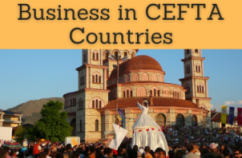Business in Macedonia, Skopje, Macedonian Economy

Macedonian Foreign Trade and Economic Growth. Transport Corridors
- Introduction to the Republic of Macedonia (Southeast Europe, Balkans)
- Macedonian Economy
- Business in Skopje
- Macedonian International Trade
- Access to the Pan-European Corridor IX
- Investment in Macedonia
- Access to the Macedonian Market
- Business Plan for Macedonia
The objectives of the subject “International Trade and Business in” Macedonia” are the following:
- To analyze the Macedonian Economy and Global Trade
- To know the trade opportunities in the Macedonian Market
- To analyze the trade relations of Macedonia with the country of the student
- To know the Macedonian Trade Agreements
- To develop a business plan for the Macedonian Market

The Subject “Foreign Trade and Business in Macedonia” belongs to the following Online Programs taught by EENI Global Business School:
Doctorate: European Business, World Trade.
Masters: International Business, Foreign Trade.
Languages:  +
+  Macedonia
Macedonia  Macedoine
Macedoine  Macedónia.
Macedónia.
- Credits of the Subject “Doing Business in Macedonia”: 1

- Duration: one week

 Master adapted to the Macedonian Students.
Master adapted to the Macedonian Students.
International Trade and Business in Macedonia

Macedonian Preferential Access and Trade Agreements:
- Macedonia and the Orthodox Economic Area
- Central European Free Trade Agreement (CEFTA)
- Central European Initiative
- Regional Cooperation Council
- Black Sea Economic Cooperation
- Macedonia-European Union
- Stabilization and Accession Agreement
- EU-Western Balkans
- EU Enlargement
- Macedonia-EFTA States Agreement
- Macedonia-Ukraine Agreement
- Macedonia-Turkey Agreement
- UK-Macedonia Free Trade and Economic Integration Agreement

- WTO
- GATS
- Agreement on Sanitary Measures
- Agreement on Technical Barriers to Trade
- Agreement on Preshipment Inspection
- Agreement on Safeguards
- Trade Facilitation Agreement
- BIC
- Chicago Convention (ICAO)
- IMO
- Convention for Safe Containers
- Istanbul Convention
- Customs Convention on Containers - not a member
- COTIF Convention (Rail)
- Convention on the Harmonization of Frontier Controls of Goods
- IRU
- TIR Convention
- Guidelines on Safe Load Securing for Road Transport
- ICC
- Is not a member of the WCO
- Revised Kyoto Convention
European Organizations:
- UNECE
- OSCE

- UN
- UNCTAD
- ITC
- WIPO
- WB
- WTO
- IMF
The Republic of Macedonia
- Macedonian Capital: Skopje
- Official Language of Macedonia: Macedonian
- Macedonian Area: 25,713 km²
- Macedonian Population: 2.1 million people
- Type of Government: Parliamentary Republic
- Macedonia is a landlocked country
- Borders of Macedonia: Albania, Bulgaria, Greece, Kosovo and Serbia
- Independence of Macedonia: 1992 (Yugoslavia)
Religion in Macedonia: Orthodoxy (Christianity).
- Islam: 25%

Macedonia belongs to the Orthodox Economic Area
Macedonian Economy.
- The Republic of Macedonia has experienced one of the highest economic growth rates in Europe with an average of 4% (even during the political crisis) making it comparable to countries like Romania or Poland
- Greece is one of the main investors in Macedonia
- Macedonian GDP (nominal): 10,198 million dollars;
- Agriculture: 10%
- Industry: 25%
- Services: 65%
- GDP per capita of Macedonia: 4,461 dollars
- Currency of Macedonia: Macedonian Denar
- Macedonia is an official candidate country for access to the EU
- Macedonia has demonstrated in the recent years a very strong commitment to the economic reforms, the principles of free trade and regional integration
- Macedonia has the best Index of Economic Freedom in the region
- Top Macedonian Industries: foods, beverages, textiles, chemical products, iron, steel, cement, energy, pharmaceutical products

Macedonian Foreign Trade.
- The main Macedonian Exports are foods, beverages, tobacco, textiles, manufactures, iron, steel, automotive parts, buses
- Top Macedonian exports destinations: Germany (33%), Kosovo, Bulgaria, Greece 4.5%
- The main Macedonian Imports are machinery and equipment, cars, chemical products, fuels, food products
- The main suppliers of Macedonia are Germany (16%), the UK, Greece, Serbia, Bulgaria, Turkey
(c) EENI Global Business School (1995-2024)
We do not use cookies
Top of this page



